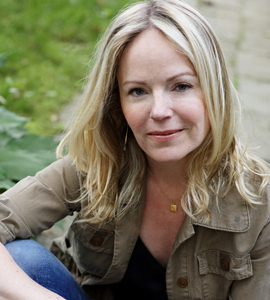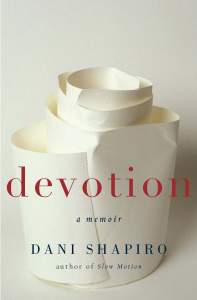Back in July, I read an essay about the making of memoir by an author named Dani Shapiro. She really impressed me, both because she offered insight into the genre and because her piece was so beautifully written.

Author Dani Shapiro
Then I heard she was about to publish another memoir. And I thought, I want to read that as soon as it comes out.
Well, it’s out. Devotion is now available in stores. (Buy it here!) And even better, Dani is with us today to talk about her book, her career as a writer and other tips like how to turn scenes from your book into magazine pieces.
Dani has published seven books: five novels and two memoirs. She also keeps a great blog.
Welcome, Dani! Can you start out by telling us about your new book, Devotion?
Devotion is a memoir about my search for something to believe. I grew up in a very religious (Orthodox Jewish) family, and I found the rules stultifying. My father was the religious one, and my mother reluctantly went along for the ride — my parents fought about religious beliefs all the time, and how to raise me, in particular. It left me feeling very alienated from the whole idea of having a spiritual life.

Dani Shapiro's new book
But then I found myself, in my early forties, feeling a vague, discomfiting sense of longing for… I didn’t know what. Deeper meaning. A way of slowing down and perceiving the world. Also, I had become a mother and my son was asking me the big questions about God, death, afterlife — he wanted to know what I believed, and I didn’t know what to tell him. So I spent a couple of years exploring and living inside of those big questions, but in a very personal way.
Devotion isn’t a book about looking outside of myself, or traveling to faraway lands, in search of answers. It’s about staying very much inside my own life and seeing what it had to teach me. Along the way, I met and became close to a Buddhist, a yogi, and a rabbi, all of whom are extraordinary teachers. I learned so much from each of them, and began to see that the all-or-nothing way I had been raised had led me to exactly that: nothing. And that it is possible to build a spiritual life, to piece it together like patchwork.
(Note from Lexi: Check out Dani’s book trailer for Devotion. It’s one of the best I’ve seen. Her choice of background music and the way she tells the story in her own voice works beautifully.)
You already wrote one memoir, Slow Motion, published ten years ago. Why write another?
Devotion and Slow Motion are such completely different books. Slow Motion is a memoir about my twenties. Devotion is a memoir about my forties. I think each is emblematic, in a certain way, of what those life stages are all about.
You’ve also written a handful of novels. How do you approach memoir differently than fiction?
The art and craft of each form dictates the approach. In memoir, the writer knows what happened. The art of memoir isn’t in discovering what happened, but rather, in how to tell the story. What pieces to leave in, what to leave out, and why — all in service of crafting a story out of memory. In writing fiction, the imagination is the primary tool. The world is wide open. The writer assumedly doesn’t know the story — and part of the great discovery when writing fiction is the way in which the story reveals itself.
You write a lot of essays for magazines. Why? You enjoy it? The income? Book promotion? Have you developed contacts at all these publications over the years, or do you still pitch some of them cold? Got any advice on what sorts of pieces work best in short form? Or on convincing magazines to run book excerpts?
I’ve always written a lot of essays for magazines, because I enjoy the essay form, and it’s also a good source of income which has supplemented my book advances and teaching over the years. And when I have a book coming out, I tend to write for magazines more, because it’s a good way to create more publicity for the book. I haven’t pitched a magazine cold in years — but that’s because I spent many years when I was first starting out meeting lots of editors and I have friends or colleagues at most magazines I want to write for. So if I have an idea, I call them, or my agent does.
I think personal essays that work best in the sort form tend to be scene-based and about one thing — not to be reductive, but sometimes I see writers trying to cram a book’s worth of ideas into a two thousand word essay, and it just doesn’t work. The essay form is like a piece of music. Writers who want to write essays should study the various lengths and deconstruct what works and why. What does a nine hundred word essay look like? A five hundred word essay? Or twenty-five hundred? They’re all different animals. They require different pacing.
Continue reading →
Filed under: Interviews, Memoir | Tagged: Dani Shapiro, Devotion, Memoir | 12 Comments »





